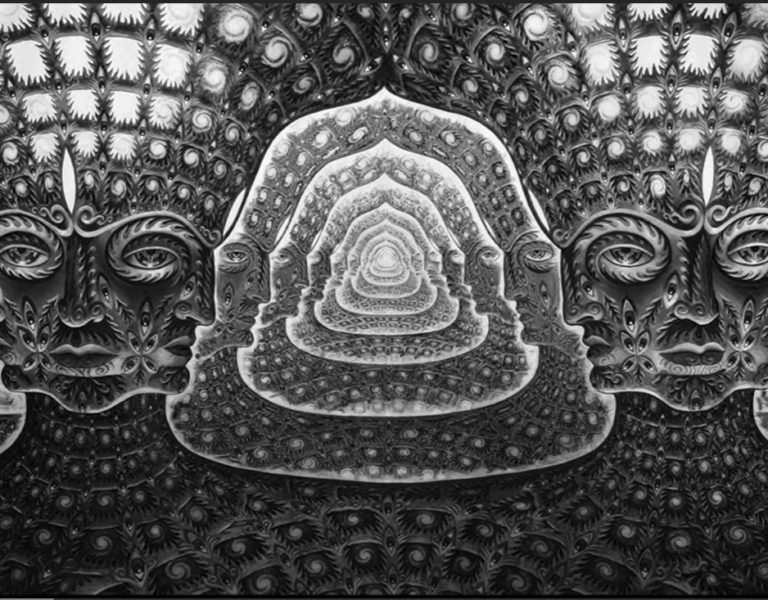The Invited Philosopher
Marina
Petralunga Restaurant Menu
- Marina’s dish: Cacio e Pepe
- Paty’s dish: Lady Devil Pizza
- Drinks: House Rosé Wine
The Philosophy
Dr. Peter Sjöstedt-Hughes from the University of Exeter, as described in his website, is an Anglo-Scandinavian philosopher of mind who specializes in the thought of Whitehead, Nietzsche, and Spinoza, and in fields pertaining to panpsychism and altered states of mind. He likes to be called the psychedelic Nietzsche. In his TED Talk he discusses understanding consciousness through psychedelics.
The Summary
Peter Sjöstedt-Hughes argues that although psychedelics are studied as therapeutics in psychoanalysis, they can be of help also to the healthy, and to the philosopher. Psychedelics can provide state of minds that are awe-inspiring, sublime, ethereal but also infernal. One can lose one’s sense of oneself as “one self”. Space is distorted and time fluctuates or disappears and senses get entangled so that “one may smell the color of time”. He argues that in order to understand the mind it requires the investigation of such psychedelically-induced states of mind. Many philosophers through time have used psychedelics, Plato for example, is known to have drunk on a special occasion a specific dose of a potion that gave him heavenly vision.
Plato wrote:
[We] saw the blessed sight and vision and were initiated into that which is rightly called the most blessed of mysteries, which we celebrated in … happy apparitions, which we saw in the pure light, being ourselves pure and not entombed in this which we carry about with us and call the body, in which we are imprisoned like an oyster in its shell
These visions led to Plato’s theory of dualism in which the mind is separate from the matter of the body and thus the mind can escape the prison of the body to a higher realm. Humphrey Day, a famous chemist, after experimenting with nitrous oxide proposed that there is nothing in the universe but thoughts or what is called “idealism”: the material world is a mental projection. Philosophers like William James, Nietzsche, and Sartre all experimented with psychedelics which either influenced their creativity or caused them hallucinations.
Analysis
As we are not experts in psychedelics, unless trying a brownie makes us experts, we had more questions than answers. Here are a few:
Do People Take Psychedelics to Escape Their Own Mind?
I argued that people take drugs to escape their own mind. And Marina brought up a good point. She said there are different types of people when it comes to considering escaping a busy or often anxious mind. Some people are fully unaware of anything besides their busy day-to-day. They embrace constant thinking and doing, and they just remain stuck in it. I told Marina that was me 10 years ago. Other people will have certain habits to escape their mind, such as watching Netflix, drinking alcohol, eating food, but they will not have the awareness or the knowledge of what they are doing, nor will they know the benefit of quieting their head chatter in a way that gives them a more permanent feeling of peace. And then there are those who know there is something else out there than their busy mind or their loud thoughts or their addictions. Some of these people will seek different methods, including perhaps psychedelics but with a guide, to enhance their state of mind, not to escape the mind.
Could psychedelics facilitate the so-called transhumanism?
Transhumanism is the transformation of mankind into a greater being.
Peter Sjöstedt-Hughes has more to say about the consequences of heightened consciousness through psychedelics:
- Heightened appreciation of the worth of nature and the beauty and value of its creatures leading to the theory of Panpsychism, that all organisms including plants have a basic form of sentience
- Gain a direct experience of the relativity of space and time
- Shatter the division between the self and the world
- Everyday assumed beliefs can be exposed as completely arbitrary and stifling
- Increase in intelligence, creativity and efficiency through micro dosing leading to a heightened awareness of the subtleties around and within us
Marina and I agree that if we were to seek such an experience we would need a guide or shaman who knows how to do the micro dosing, and try it in a controlled environment. From another book I have been reading, “Center of the Cyclone” by scientist John C Lilly, I learn that he had positive experiences with LSD and a very bad one that sent him into a coma. He always had a guide with him except one time. The guide would watch him and document what he was doing and how he was acting.
Should we seek to be some sort of Transhuman Genius?
Marina gave the example of musical geniuses like Mozart and Beethoven and how psychedelics could perhaps help regular people gain enhanced talents and become geniuses. We quickly, however, remembered that although we do not know much about the state of mind of the musicians of classic music who lived in other eras, many contemporary musicians of great talent are known to suffer from depression and commit suicide. We talked about Audioslave lead singer Chris Cornell who suffered from depression and committed suicide. We did not talk about Kurt Cobain or Prince but both suffered from depression, both took drugs, and both found the same ending.
After our dinner, I looked up Mozart and learned he suffered from depression too, especially close to his death, although his death was not a suicide but due to a rheumatic inflammatory illness.
We did not discuss this but it is quite possible that for many modern musicians the experience of drugs (psychedelics) starts with depression. Depression lowers the moral/mental barrier to taking drugs, which then leads to enhanced creativity and fame. What the enhanced creativity does not do, and Peter Sjöstedt-Hughes does not claim it does, is lead to happiness. My answer to this question is therefore “no”.
Can Psychedelics Reveal our Purpose in Life?
Marina asked a question along those lines. I have pondered the question of a “Life Purpose” for many years, and so, I did the mistake of not digging deeper into what she thinks is her specific purpose in life. Instead, I asked her if she thought goals were important, and she seemed to think that they are and that perhaps it was the role of psychedelics to reveal them. I argued, based on what I have read in spiritual books and philosophy books that any goal, role, or purpose that is linked to the external physical world does not matter. We can pick any goal, we can be a musician, or a housewife, or do nothing at all, and it is all fine as long as we follow our inner purpose. Our inner purpose is what matters and it is shared by all people. The inner purpose, according to philosophers is to understand life, and for that perhaps, yes, psychedelics help, but there are other ways also, for example, philosophy and meditation. The inner purpose, according to spiritual gurus, is to remain unattached to anything that happens in the external world, to be in tune with the comings and going of events, to go with the flow and not be affected by it.
Marina then asked, well, if we have no goals and we do nothing then how is that good? My answer was that if we live in society, we do need goals, but the goals do not matter. We have to do something, we need to be active, do and create, but what is important is “how” we do it, not what we do. We should do it with detachment, remain relaxed, easy going, watch the unfolding of our destiny like watching a movie or a game in the Olympics. I also told her that, yes, we could also choose to do nothing much, but then we might want to leave civilization, go to a remote area of this world, for example, Nepal, and live in a Buddhist monastery and meditate all day. That does not seem an option for us at this point, especially for someone with family responsibilities. Yet, even as we stay in society, and find goals or things to do, they are just that, “things to do”. What matters is how content we feel when doing them.
Can you step back from your own mind, and thus understand all things?
― Tao Te Ching, Chapter 10

